In this blog post, we will be exploring the intuitive eating principle number 3. We learn how make peace with food through intuitive eating.
If you’ve been following my YouTube channel or my blog, you may have seen that I’ve been posting a lot about the intuitive eating principles and I’ve actually started a series called Enlightened By Intuitive Eating. Each piece of content I’ve been sharing reflects one of the intuitive eating principle, and my goal has been to walk through these principles with you and learn about the intuitive eating journey together. If you missed it check out my post covering principle one and my video covering principle two. In this blog post we will be exploring the intuitive eating principle number 3 and learn how to make peace with food.
Before we get started, I want to answer a frequently asked reader question.
Can I Be an Intuitive Eater Without Giving Up my Moral Values Around Veganism?
The answer is absolutely. It’s important to first take a second to think about WHY you are choosing to live a vegan lifestyle.
Are you eating vegan to lose weight?
Are you trying to prevent yourself from eating “bad” foods?
These are reasons that aren’t obviously in line with the intuitive eating principles. Even if it’s not currently why you’re vegan, think back to determine if controlling food, “detoxing”, or restricting without “dieting” was part of the initial reason for going vegan.
I want you to ask yourself these questions and really do a deep dive to get to the root of how and why you’re living a vegan lifestyle to ensure it’s still there to support you and your wellbeing.
Most vegans who have a good relationship with food abstain from animal products for ethical, environmental, and/or spiritual reasons. As part of a vegan lifestyle, many vegans do not even identify animal products as food. Just like you wouldn’t call paper food, or dirt food, or poison as food, they would view animal products as inedible.
In this case, avoiding/restricting animal products isn’t the same as restricting food for the purposes of weight loss or “clean eating”. It’s simply that the person doesn’t see animal products as being part of their “food environment”, so limiting or restricting them is not an act of denial. It’s a similar experience for someone who eats Kosher, or someone with an anaphylactic allergy to peanuts. Their food environment does not include pork or peanuts, in those examples, so the dietary choice is not coming from the same sense of scarcity that one might experience with dieting.
It’s also important to note that veganism is not about restricting “food groups”. You can still have grains, you can still have vegetables and fruit, and you can still get your protein from amazing plant-based sources such as tofu, tempeh, nuts, seeds, etc.
How do i ensure intuitive eating gets me all the necessary nutrients I need without obsessing?
I think there’s a big difference between a meal plan and meal planning.
I think a good dietitian could definitely help take a look at your current habits and focus in on how those habits effect your micronutrient intake with some recipe ideas and meal planning support- not a strict rigid meal plan. This might involve keeping tabs on what you’re eating for a few days, not for ever, and then together, looking at that to see which staples contribute those important nutrients and what are some options to add in in the event things are lacking. Ideally we shouldn’t have to eat the same thing every single day to ensure you’re getting enough but I appreciate that we may need a bit of guidance here when you’re in the early days of transitioning to fully plant based.
So a vegan diet that is aligned with each intuitive eating principle would mean not restricting any particular type of food group, and allowing yourself permission to eat all foods that you identify with being “food”.
That leads us to the intuitive eating principle number three: make peace with food.
intuitive eating principle 3: make peace with food
This is a really important part of the IE series because the intuitive eating principle number three emphasizes the importance of rebuilding your relationship with food. As always, these coming from the intuitive eating principle book by Dietitians Evelyn Tribole and Elyse Resche.
When it comes to intentional weight loss diets, they all have one main thing in common: restricting certain foods or amounts of foods. And this is exactly why I believe the research suggests that diets are not effective long-term. They force you to ban certain foods from your diet and assign a “good” or “bad” label to them.
Funny thing is, when we restrict food, we tend to want it more than anything and when we get it, the reward centre of our brain starts firing off. This principle actually applies to anything. Think about when you’re sick and you’re stuck in bed for a week. After a few days, all you want to do is go outside and breathe in some fresh air. When we can’t have something, we want it even more. We appreciate it even more Kids are notorious for this as well. If you tell them they can’t do something, let’s say go into your bedroom, you’ll eventually find them in your bedroom. Or when I was a teenager and my dad said I couldn’t wear the skimpy crop top which made me want to wear it even more. Why? Because as humans, we don’t like limitations. We don’t like being told no. And we certainly do not like feeling deprived.
So in general deprivation can actually increase our desire for something. The more you can’t have something, the more you want it because it’s now viewed as something super novel and special. As soon as you restrict food, you place it in a special box. It becomes special compared to any other type of food. Sure, you can go a while without it, but eventually just thinking about it all day every day makes the restriction unbearable and you crack.
A good example of this is chocolate. A lot of people say that they can’t have chocolate around them because they will eat it all in one sitting. So, what do they do? They don’t have it at all and they keep it out of their house. Quickly, chocolate is built up to be this magical forbidden food with an enormous amount of power over us. Once we finally come in contact with chocolate again, we can’t help but overindulge while it’s available because we know it’ll be gone for a long time again.
Another example is the days before starting a diet. Right before starting a diet full of deprivation, many people will go for a “last supper” and eat as much of the “bad” food as they want. But this really tends to backfire because we’re again telling ourselves that these foods will be missed. If you have to have a ceremonious dinner before you start a diet, chances are that is not the best diet to be on.
examples of food restriction
1. food competition
This is a “get it while you can” mentality. Good food marketers know that FOMO is a real thing. By making a food scarce, you will load up and eat as much as possible before it is gone. This can also apply to a favourite dish of yours or a bag of chips in the cupboard. Knowing it won’t be there long creates an intense desire to eat as much as you can.
2. Returning home
For anyone that goes away for school, you’ll know the amazing feeling of raiding your parents cupboards for food. If we go a long time without the foods we’re used to, we start to miss it. Then, once we have access to it again, we may go a bit overboard. This doesn’t just happen for sweets and treats, it can happen for other foods too. For example, a lot of people say they miss salad after being on a vacation. Remember my video on intuitive eating on vacation? UGH I wanted salad and fresh raw vegetables like crazy! Case in point, we don’t like restricting ourselves on either end of the spectrum!
3. Clear-your-plate mentality
This mentality was especially true during the Great Depression when food was scarce. Many families encouraged children to “clean their plate” as it was wasteful to throw out food. This has been passed on for generations. Unfortunately, this can also backfire. If you deprive yourself, you may feel guilty about “wasting” a dish while eating out and end up overdoing it. Instead, if you are in control of your eating and have a good relationship with food, you know that you can bring this food home for leftovers or perhaps share it with a friend. There are lots of options we can explore.
how is dieting possible?
If our biological and psychological aversion to dieting is so strong, then how do people diet?
Well, if you have watched previous episodes, you’ll know that I have a strong admiration for our brilliant body. It’s seriously so intelligent. People who diet all the time (aka Chronic Dieters) are able to adapt to long-term dieting through an adaptation process called “restrained eating”. They become accustomed to ignoring their internal hunger cues and over time, they just don’t hear them anymore.
These people tend to set up extremely strict rules and completely ignore anything their body (and friends) are telling them. They’re able to stay on the diet for quite some time until one of their strict rules eventually is broken or their “willpower” gives out. Essentially, they view their rules as all-or-nothing. They either have the “willpower” to follow them to a tee, or they cave and throw all of that out the window.
I used to be this person when I was struggling with orthorexia and even still, I’m not as comfortable in the grey.
is there research to back this up?
Yes! There’s quite a bit of research to support the ineffectiveness of diets that promote deprivation.
In one study, researchers split female college students into three groups: 1) No milkshake, 2) One milkshake (8 oz), 3) Two milkshakes (8 oz x 2)
After they ate the milkshake, they were asked to enter a private room and sample different types of ice cream. They were encouraged to have as much as they wanted.
Two interesting things were found:
- Those who were classified as “dieters” ate significantly more ice cream than those who were classified as “non-dieters”
- The dieters that had milkshakes were much more likely to overeat ice cream, suggesting that a “preload” of “bad food” triggered them to forgo their diet and eat as much as possible knowing that restriction would soon be following.
The non-dieters easily regulated their eating and stopped when they were satisfied. On the other hand, the dieters were unable to regulate their intake, which is a process called “counter regulation”. The researchers determined that encouraging the dieters to overeat caused them to forgo their restrictive inhibitions and as a result, overeat.
This overeating effect by dieters is known as the “what the hell” effect. Essentially, the dieters believe that since they’ve broken the rules of their diet, they might as well overdo it.
In another study, researchers found that overeating was a combination of restraint and impulsivity. If a person restricted food and it exacerbated their drive for the food (i.e., increased impulsiveness) then they were more likely to overeat.
A good way to demonstrate this is the see-saw example.
On one end of the see-saw we have deprivation/restriction. On the other end we have guilt.
When we’re on a diet, we restrict and restrict which causes that end of the see-saw to go higher and higher. On the other hand, we feel less guilty because we’re not eating any “bad” foods. So, as deprivation goes up, guilt goes down.
But if you’ve ever been on a see-saw, you’ll know that it reaches a limit. Deprivation can only go so high before it comes crashing down. Once it does, we see guilt go flying up. In other words, you feel like shit because you “caved”. This is why dieting is hardly ever sustainable. It creates this up-down effect that causes chaos in our mind and body.
However, let’s say you balance out your deprivation/restriction. You don’t restrict anything, but you’re in tune with your body’s true needs. This also balances out your feelings of guilt because you’re no longer feeling bad about overindulging but you’re not flying high on the fact that you eat perfectly. As a result, you’re in balance.
how to make peace with food with intuitive eating principle 3
The answer is to give yourself 100% unconditional permission to eat. No restrictions. No rules. Just pure permission.
I also want to flag that while this sounds super scary and also like, how the hell can this be healthy? I’m going to just eat chips and ice cream all day, and a dietitian is saying that’s cool. Know that this isn’t all intuitive eating is. To believe that is completely misconstruing the concept and the research that supports it.
There are 10 intuitive eating principles that build on one another and we need to reject the diet mentality, and make peace with food so you can rekindle your TRUST in your body and food, before we can implement gentle nutrition guidelines. This is really important, and we will get there, but there are a few steps first.
Until you 100% believe that you’re allowed ANY food, you will always feel a sense of deprivation, even if there isn’t PHYSICAL deprivation happening.
So, what does this look like?
toss out the idea that there are morally “good” and “bad” foods
Yes, I will not deny that foods may be NUTRITIONAL unequal, I’m a dietitian, I know way too much about the fibre and fat content of foods. But if we make them MORALLY equal, we’re less likely to obsess over them and stay in control.
get rid of strict conditions surrounding food
For example, “I’ll eat this today, but I have to workout another hour tomorrow”
As soon as you start allowing yourself food freedom, you take away the power food has on you and you really decrease the chances of overeating. Will you overeat at first? Yes, probably as you are essentially going “off” the diet which we know from our experience tends to lead us to overeat. But once you become accustomed to being around all types of foods, they actually start to lose their specialness.
What does the research say about this working?
At first this will seem like a challenge, but remember it takes time to dispel all the diet-culture BS that has been fed to us for years. As you start to take power away from food, you will naturally be less inclined to eat it all the time. In fact, even if you allowed yourself to eat a lot of Cheetos, you’re eventually going to get tired of them.
Research calls this habituation. Basically, the more a person is exposed to a food, the less appealing that food becomes. A good example is going on vacation. If you’re at a resort and you see a huge table of all-you-can-eat food, the first few days you’ll probably fill up your plate as much as you can. But as days go on, you may start to grab a salad or some fruit. You probably won’t create a mountain of food on your plate. It’s the novelty and excitement that causes us to overeat. But if we’re used to it, it becomes “normal” and less exciting. So, same thing with forbidden food. The more you normalize it, the less exciting it becomes.
This was found in a 2011 study in which participants were given mac and cheese daily or weekly for 5 weeks. The research showed that participants that had the mac and cheese daily slowly started to eat smaller and smaller portions. On the other hand, those that were only given the mac and cheese weekly ate similar amounts. The authors attributed this to a phenomenon known as the Sometimes Opponent Processes (SOP) theory to habituation. Basically, when a food is introduced, a memory for this food is created and activated to a high level (called A1 state). However, the memory eventually starts to decay over time and enters an A2 state. If a food is introduced shortly after when it’s in the A2 state, the stimuli for this food won’t be as strong. However, if enough time has gone by that the person has limited memory of the food, then they go right back to the excited state of this food and there’s a higher drive to eat it.
Therefore, by allowing yourself regular access to all foods, they lose their novelty and you don’t feel such a drive to overeat them.
Also keep in mind that we constantly fall victim to self-fulfilling prophecies. Simply believing you’re going to fail almost always leads to that. So, believing that being around chocolate will cause you to overindulge may cause you to overindulge. You need to develop trust within yourself that you can do this. You are capable of listening to your body. This IE journey is about rebuilding your relationship with both food and yourself.
what if you only want to eat “junk” food?
First of all, part of this exercise or step in intuitive eating protocol is to try to not think about it as junk food. The goal in this stage of intuitive eating principle training is to treat all food exactly the same. So, while I know it’s in our culture’s vocabulary, the best thing you can do is ditch that type of talk. When we get to gentle nutrition and honouring our health, we will be able to dive deeper into which foods best support our physical and mental wellbeing.
Second, when you’re given free choice, you may feel like you have an all-access ticket to eat “unhealthy” food. And you do. But as I mentioned earlier, the novelty does wear off. You may enjoy some extra fun foods for the first bit but overtime you’ll likely start to crave variety and what legitimately FEELS good to your body. We will be chatting more about this in an upcoming episode.
tackling each intuitive eating principle in baby steps
I know that this is super scary for people, so I sometimes recommend baby steps to help neutralize these “trigger” foods. Breaking it down into manageable bites sometimes feels more manageable than the lofty idea of just throwing caution to the wind on EVERYTHING.
So choose one food to start and lets’ attack this with some structure.
So in my book, Mindful Glow, I disclose that my “trigger” food used to be sugary cereal. If it was in the house, I would eat it mindlessly all day long so I wouldn’t buy it out of fear that I would lose “control”.
So my intuitive eating journey with it started with me buying the cereal.
I then told myself I could have cereal every day. And I did. The first day, I found I had my breakfast with cereal, and still wanted to snack on it later in the day. But soon enough, I didn’t have the desire to snack on it, and I wasn’t even that excited in the morning anymore to have my sugary cereal breakfast. It very quickly became just another food. One I enjoyed, but not one I was obsessed over and I started to implement some gentle nutrition. I noticed I was hungry soon after having my cereal, so I started to mix it with a bran cereal or Greek yogurt to up the satiety factor. The next time we ran out of the sugary cereal, I kinda just forgot to buy it again. It lost its power, it was no longer so enticing.
Once you’ve had “success” neutralizing your big trigger food, you’ll maybe have some new found confidence that this can be applied to other foods that you have consciously or unconsciously restricted or seen through a moral lens.
Your intuitive eating homework this week
Before you start this process, you may want to check out my first two videos on IE, which are the stepping stones to making peace with food. If you’re not in-tune with your hunger signals, then these steps may be hard to work through.
For this week’s homework, I want you to start reintroducing foods you previously restricted. Here’s how:
1) Write a list of foods that are appealing to you
2) Check off any foods that you actually allow yourself to eat regularly. Circle any foods that you have restricted in the past or present.
3) Plan to allow yourself to eat one of those forbidden foods, as much as you want, either at home from the store, or in a restaurant.
4) While you eat the food, check in with yourself. Think: Is this as good as I remember? If it is, then continue to allow yourself to have it from now on. If it’s not, then it could just be the history of deprivation that caused you to want it in the first place. This is how I feel personally about Halloween candy. I used to crave it when I was restricting sugar, but it just doesn’t taste good to me anymore and I can easily ignore it.
You can start with just one food if you’re more comfortable before tackling another on your list, or you can go “all in” if that feels easier. I want this to be your journey and to take it at the pace you’re comfortable with. And it gets too scary, and you need to take a step back. That’s okay too. you’re not failing. Even proving to yourself that you no longer are obsessed with cheese or cupcakes or cookies if usually really important data to prove that other foods also don’t deserve so much power either.
Careful of the trap
Before I finish, I just want to highlight something important.
A lot of criticism around IE is that it promotes overeating and overindulgence of food. The idea of IE is to make peace with food and welcome any food into your diet. It’s NOT about overdoing it and eating whatever you want, whenever you want, and however much you want. It’s about listening to your body’s needs. You have PERMISSION to eat whatever you want whenever you want, but doing so without listening to how your body feels won’t be a satisfying experience. Sometimes some emotional eating is normal, and the key here is not to punish yourself to fall into the binge restrict repeat cycle.
But if you’re eating beyond your needs all of the time, or relying too heavily on food as an emotional coping mechanism, that’s not supporting your health either. It’s not a fun experience to feel so full you’re sick to your stomach, and food will not solve all of our problems.
This is situation where I would suggest speaking to a therapist even if you’re not physically restricting food and just seemingly overeating. There may be some psychological restriction going on and trying to force your relationship with food into a neutral zone without addressing this will likely keep you trapped in the diet cycle.
bottom line
Remember that IE takes time to learn and it’s really about respecting your body’s natural cues. Continue to work on these steps throughout your IE journey and stay tuned for my next post on the intuitive eating principle number four: Challenge the Food Police.
Become an Abbey’s Kitchen Subscriber
Contribution By:
Katey Davidson, RD, Taste of Nutrition
Updated on May 12th, 2020

Abbey Sharp is a Registered Dietitian (RD), regulated by the Ontario College of Dietitians. She is a mom, YouTuber, Blogger, award winning cookbook author, media coach specializing in food and nutrition influencers, and a frequent contributor to national publications like Healthline and on national broadcast TV shows.
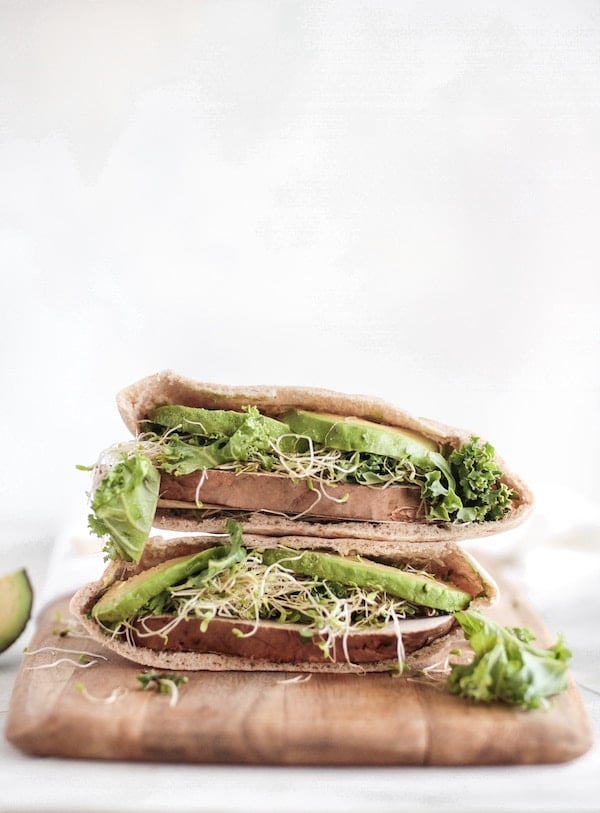




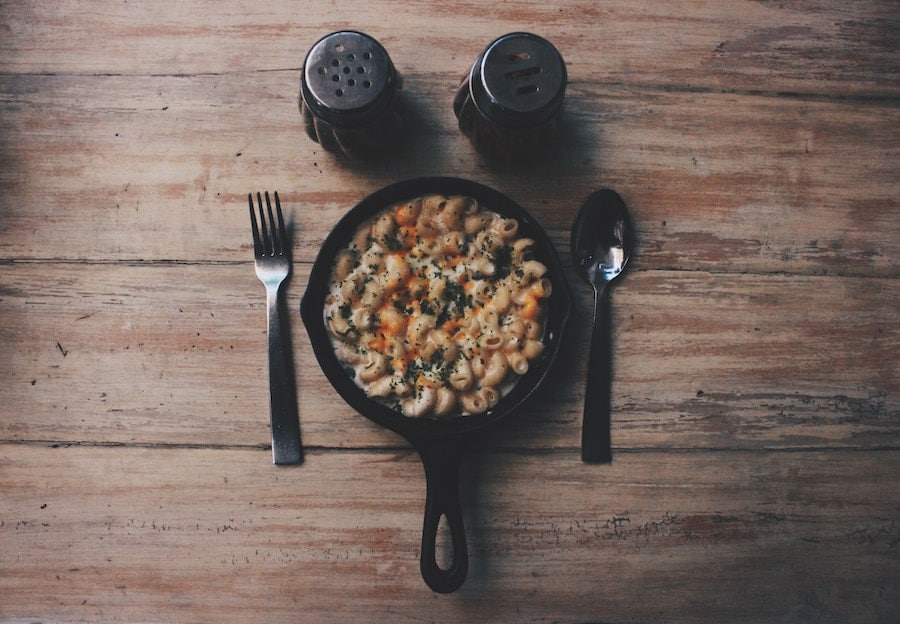

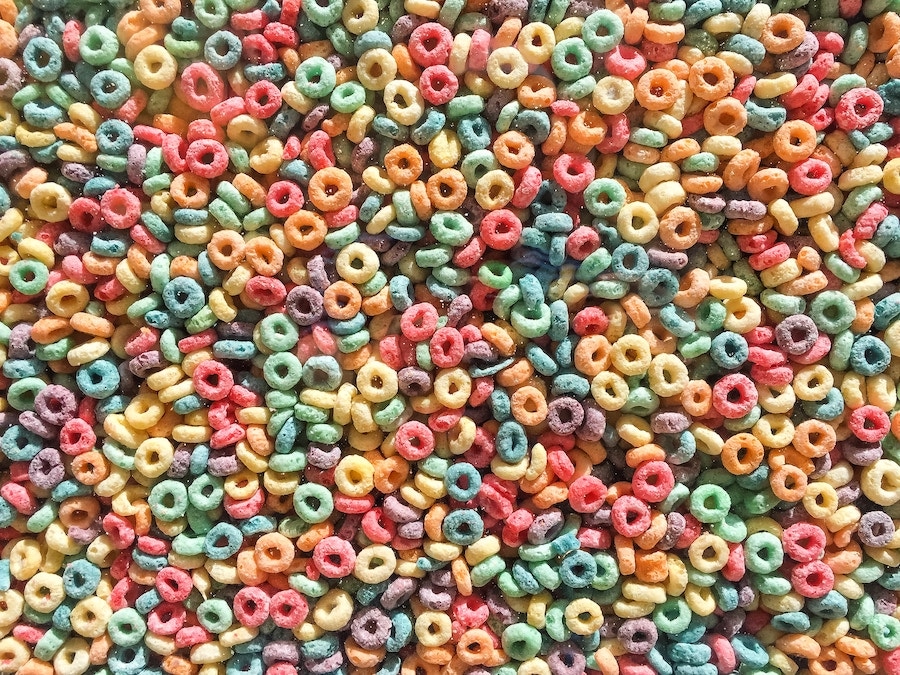

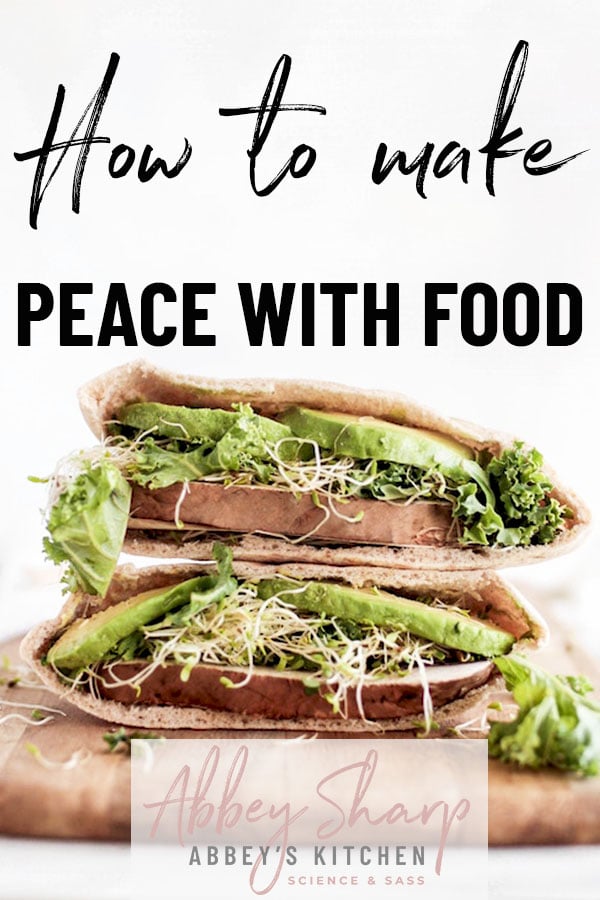
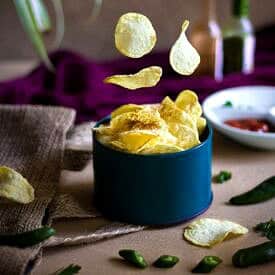



Leave a Comment